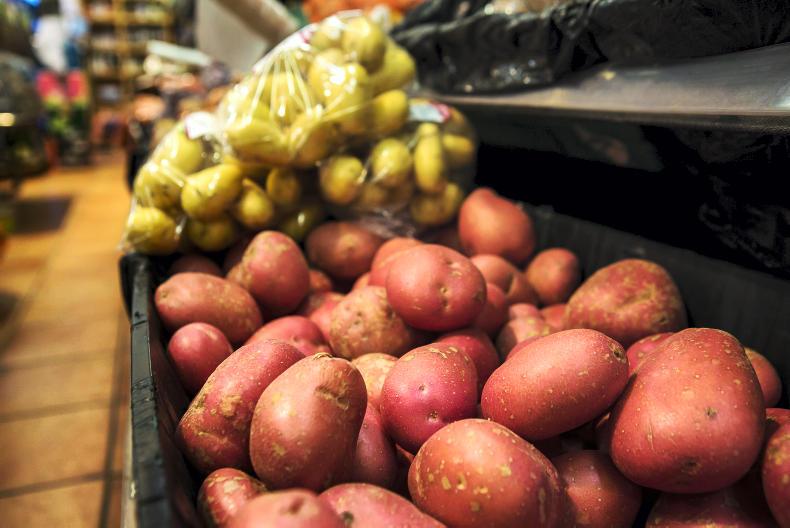“Our strategy since the Brexit vote has been to maintain and defend the UK market,” says Bord Bia CEO Tara McCarthy, commenting on the performance of Irish food and drink exports to the UK last year.
She added that the industry has to remain committed to the UK market.
With food and drink exports to the UK up by almost €100m (2%) last year to reach €4.5bn, it suggests Irish food exporters continue to depend on the UK market for a large proportion of their exports.
Overall, the UK now makes up 37% of all Ireland’s food and drink exports.
The main driver of this growth into the UK last year has been dairy (up 6%) and beef (up 4%), which make up 60% of exports to the UK.
The increase in dairy to the UK was mainly formed by large increases in the amount of liquid milk and cream being processed in Northern Ireland and significant rise in the volume of powders.
We cannot turn our back on the UK market
Cheese exports to the UK, which takes half of all our cheese exports, were back 9% in 2018.
This is mainly as a result of Irish processors ageing cheeses in Ireland to help hedge currency concerns. On the beef side, exports to the UK increased 4% to reach €1.3bn due to lower local supplies in the UK.

“We cannot turn our back on the UK market,” she says. “If we are looking to protect returns to the farmer, the UK remains the best returning market of scale, particularly in beef.”
Asked if she is worried about the impact of a no-deal Brexit on farmers, she said: “I am concerned for the supply chain from farmers to processors to logistics.”
She adds: “If this happens, beef and horticulture, and particularly mushrooms, will be most affected.”
“These categories have the least choice to diversify – a dairy processor has options, a beef processor does not.”
So does this mean Irish beef will not be on shelves in the UK after 31 March?
“Post-Brexit, UK supermarket shelves will not be flooded by Brazilian beef,” states McCarthy. She doesn’t see how the UK supermarkets will delist products.
“Supermarket buyers do not want empty shelves – this is a lost profit opportunity,” she adds.
The supermarkets use beef to drive footfall. Bord Bia has held meetings with the CEOs of all the major food retailers and she says they are now mitigating their risk of a UK crash out of the EU.
The retailers are building up stocks locally in the UK and are demanding the brand holders do the same.
This is to provide some level of comfort in the worst-case scenario.
She adds that the retailers won’t risk their brand and lose footfall with a food product or supply chain that they do not trust.
She says they have not conducted any modelling or scenario planning in terms of demand for product in the case of a hard Brexit with WTO tariffs which can add as much as 50% on top of the price of certain foods.
Global context
“Globally, 2018 can be described as a year of instability,” says McCarthy, as she sets the context in which exports of Irish food and drink had to perform last year. She said trade disputes such as the one between the two largest economies (China and the US) had significant knock-on effects for international trade.
She adds that trade disagreements between the US and the EU early last year could have escalated to a situation where further disruption was caused.
Not to mention the ongoing negotiations between the UK and the EU and the volatility in the sterling exchange rate.
She said these challenges had a significant impact on Irish food and drink exports, resulting in a decline in beef prices and the commodity price of butter in the latter half of 2018.
Overall, she is satisfied with the performance given the global context. While export values are back 4% to €12.1bn, she says that over the last eight years, exports have grown by almost €5bn or 64%.
International markets have been responsible for the majority of this growth, driven by Asia, North America and Africa. In 2010, some €1.8bn was exported to countries outside the EU. Last year, that reached €3.5bn.
But she says two drivers dragged exports by 12% to international markets last year.
She explains there was a change in transfer pricing for infant formula by one multinational during the year along with a decline of powdered food preparation to the US.
She said that despite this value loss, which is mainly on paper, volumes have held.
She said that exports to the EU have also performed well given that it is a mature market, with the Netherlands, Italy and Spain driving the growth mainly across three categories – butter, beef and enriched dairy powders.
Overall, she believes Irish food companies have done as much as they can do in the context of the information that is available to them.
She concluded: “The industry is resilient, the structure is strong and global demand is positive.” And she reiterated the importance of continuing to open up new markets to develop markets outside the EU.
“Our strategy since the Brexit vote has been to maintain and defend the UK market,” says Bord Bia CEO Tara McCarthy, commenting on the performance of Irish food and drink exports to the UK last year.
She added that the industry has to remain committed to the UK market.
With food and drink exports to the UK up by almost €100m (2%) last year to reach €4.5bn, it suggests Irish food exporters continue to depend on the UK market for a large proportion of their exports.
Overall, the UK now makes up 37% of all Ireland’s food and drink exports.
The main driver of this growth into the UK last year has been dairy (up 6%) and beef (up 4%), which make up 60% of exports to the UK.
The increase in dairy to the UK was mainly formed by large increases in the amount of liquid milk and cream being processed in Northern Ireland and significant rise in the volume of powders.
We cannot turn our back on the UK market
Cheese exports to the UK, which takes half of all our cheese exports, were back 9% in 2018.
This is mainly as a result of Irish processors ageing cheeses in Ireland to help hedge currency concerns. On the beef side, exports to the UK increased 4% to reach €1.3bn due to lower local supplies in the UK.

“We cannot turn our back on the UK market,” she says. “If we are looking to protect returns to the farmer, the UK remains the best returning market of scale, particularly in beef.”
Asked if she is worried about the impact of a no-deal Brexit on farmers, she said: “I am concerned for the supply chain from farmers to processors to logistics.”
She adds: “If this happens, beef and horticulture, and particularly mushrooms, will be most affected.”
“These categories have the least choice to diversify – a dairy processor has options, a beef processor does not.”
So does this mean Irish beef will not be on shelves in the UK after 31 March?
“Post-Brexit, UK supermarket shelves will not be flooded by Brazilian beef,” states McCarthy. She doesn’t see how the UK supermarkets will delist products.
“Supermarket buyers do not want empty shelves – this is a lost profit opportunity,” she adds.
The supermarkets use beef to drive footfall. Bord Bia has held meetings with the CEOs of all the major food retailers and she says they are now mitigating their risk of a UK crash out of the EU.
The retailers are building up stocks locally in the UK and are demanding the brand holders do the same.
This is to provide some level of comfort in the worst-case scenario.
She adds that the retailers won’t risk their brand and lose footfall with a food product or supply chain that they do not trust.
She says they have not conducted any modelling or scenario planning in terms of demand for product in the case of a hard Brexit with WTO tariffs which can add as much as 50% on top of the price of certain foods.
Global context
“Globally, 2018 can be described as a year of instability,” says McCarthy, as she sets the context in which exports of Irish food and drink had to perform last year. She said trade disputes such as the one between the two largest economies (China and the US) had significant knock-on effects for international trade.
She adds that trade disagreements between the US and the EU early last year could have escalated to a situation where further disruption was caused.
Not to mention the ongoing negotiations between the UK and the EU and the volatility in the sterling exchange rate.
She said these challenges had a significant impact on Irish food and drink exports, resulting in a decline in beef prices and the commodity price of butter in the latter half of 2018.
Overall, she is satisfied with the performance given the global context. While export values are back 4% to €12.1bn, she says that over the last eight years, exports have grown by almost €5bn or 64%.
International markets have been responsible for the majority of this growth, driven by Asia, North America and Africa. In 2010, some €1.8bn was exported to countries outside the EU. Last year, that reached €3.5bn.
But she says two drivers dragged exports by 12% to international markets last year.
She explains there was a change in transfer pricing for infant formula by one multinational during the year along with a decline of powdered food preparation to the US.
She said that despite this value loss, which is mainly on paper, volumes have held.
She said that exports to the EU have also performed well given that it is a mature market, with the Netherlands, Italy and Spain driving the growth mainly across three categories – butter, beef and enriched dairy powders.
Overall, she believes Irish food companies have done as much as they can do in the context of the information that is available to them.
She concluded: “The industry is resilient, the structure is strong and global demand is positive.” And she reiterated the importance of continuing to open up new markets to develop markets outside the EU.







 This is a subscriber-only article
This is a subscriber-only article











SHARING OPTIONS: